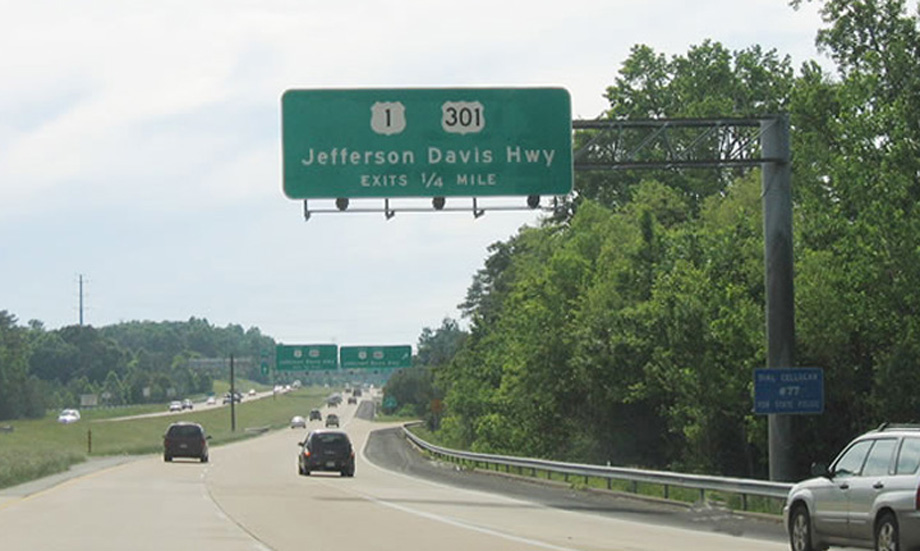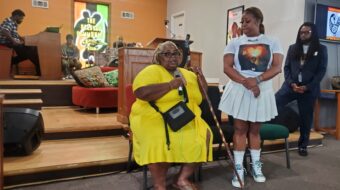
PRINCE WILLIAM COUNTY, Va.—The fight to change the name of a major highway in northern Virginia is heating up. The road, U.S. Route 1, is officially known as the Jefferson Davis Highway in several places. The northern Virginia towns of Arlington and Alexandria are already making efforts to change this name, and now the same movement has come to Prince William County, further to the south.
Jefferson Davis was the only president of the Confederate States of America. Before ascending to that office in 1861, he had previously been a career army officer, achieving the rank of colonel. He also did well as a slave owner. After the Mexican-American War (1846-1848), he became a senator, and pushed for the seizure of even more of Mexico’s territory than the United States had already taken, in order to allow for the expansion of slavery. He also promoted U.S. annexation of Cuba. Later, he served as Secretary of War under President Franklin Pierce.
Always pro-slavery and pro- states’ rights, but originally opposed to secession, Davis was made first provisional president and then president of the Confederate States of America when the Civil War broke out.
As president, Davis was considered by colleagues to be cantankerous, unreasonable, prone to favoritism, and not very competent. His most inglorious moment came on Dec. 24, 1862. In a truly bizarre proclamation, Davis ordered the execution, without trial, of Union Major General Benjamin Butler, commander of the federal troops in New Orleans, and any commissioned officers under his command should they fall into Confederate hands.
Further, Davis’ order mandated that African-American soldiers in the Union army be enslaved if captured, and their white officers executed, also presumably without trial.
Abraham Lincoln’s government firmly responded that if any such executions were carried out, Confederate soldiers held by the Union army would be executed in reprisal. So Davis’ order was not officially implemented, though there were plenty of atrocities, especially against African-American troops, such as the Fort Pillow Massacre of April 12, 1864. Also, prisoner exchanges between North and South were impeded by the fact that the Confederate government refused to exchange African-American soldiers of the Union army on the same basis as white prisoners of war.
After the war, plans were made to put Davis on trial for treason, but in the end he was let go.
As the racist and reactionary elements in the white South gained the upper hand after the federal government abandoned Reconstruction and left the African-American people to the tender mercies of the Ku Klux Klan and lynch mobs, Davis was converted from being a cranky and ineffective political leader into a hero of the sacred cause of the South. Statues were erected, and roads, schools, and other public buildings were named in his honor.
In 1913, the United Daughters of the Confederacy, one of the most influential groups dedicated to whitewashing (literally) Confederate history, succeeded in lobbying to get the name “Jefferson Davis Highway” approved for a route that was supposed to go from Washington, D.C. to San Diego, Calif., with some additional stretches branching off. The promotors of the name billed the move as one that would help heal the wounds of the Civil War.
But at the same time, United Daughters of the Confederacy and its allies were also promoting the erection of monuments to many Confederate generals all over the South. As this movement coincided with the worst atrocities of the revived Ku Klux Klan and lynch laws, the argument of “healing the wounds” doesn’t wash.
Lately, the name “Jefferson Davis Highway” no longer pollutes many stretches of the original highway. But in northern Virginia, it is still the official name in Arlington, Alexandria, and in Woodbridge in Prince William County.
In both Arlington and Alexandria, there have been recent attempts to change the name. Alexandria’s city council passed a measure last year to do so, but Arlington and Prince William, which have a lower level of official autonomy, would have to get the authorization of the Virginia General Assembly, currently with Republican majorities in both houses, to do so. There does exist, however, the option of removing the “Jefferson Davis Highway” street signs as a stop-gap option.
On Wednesday October 3, with the mid-August outrage in Charlottesville still on many people’s minds, Supervisor Frank Principi of Woodbridge presented a name change motion at the meeting of the Prince William County Board of Supervisors. Principi’s motion called for changing the name of Jefferson Davis Highway and also of two schools and a fire station currently named after Confederate General Thomas “Stonewall” Jackson.
In the meeting room were many representatives of citizens’ organizations which strongly support changing the name changes, including the Prince William County NAACP. The Board heard testimony, all in favor of the name changes, from numerous residents of the county.
But Principi could not even get a second for his motion, and it is dead for now. This so angered members of the public that they began to shout, “Shame, shame.” The Chairman, Corey Stewart, a virulently xenophobic far-right figure who was involved in the Charlottesville events and is now running for Senate against Democratic Sen. Tim Kaine, then ordered the room cleared. Stewart is so notorious for his extremist xenophobic and pro-Confederate statements and behavior that the Prince William County NAACP has called for his ouster.
Several members of the Republican-dominated board criticized Principi, claiming that the way he went about proposing the name change was partisan and divisive, and even “opportunistic.”
What really worried them, in all probability, is that there are County Board elections in 2019, and Prince William County is now majority minority, with the minority population growing. In particular, the stretch of Jefferson Davis Highway that passes through the community of Woodbridge goes through areas that are heavily African-American and Latino, so this definitely could become an electoral issue sometime in the near future.










